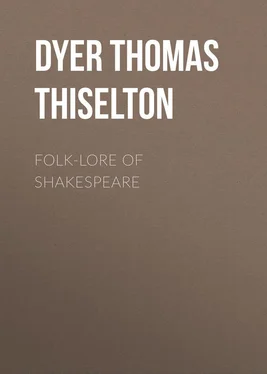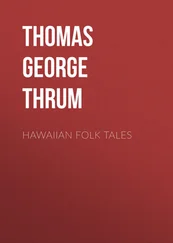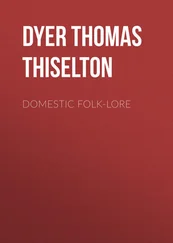Thomas Dyer - Folk-lore of Shakespeare
Здесь есть возможность читать онлайн «Thomas Dyer - Folk-lore of Shakespeare» — ознакомительный отрывок электронной книги совершенно бесплатно, а после прочтения отрывка купить полную версию. В некоторых случаях можно слушать аудио, скачать через торрент в формате fb2 и присутствует краткое содержание. Жанр: foreign_antique, foreign_prose, на английском языке. Описание произведения, (предисловие) а так же отзывы посетителей доступны на портале библиотеки ЛибКат.
- Название:Folk-lore of Shakespeare
- Автор:
- Жанр:
- Год:неизвестен
- ISBN:нет данных
- Рейтинг книги:4 / 5. Голосов: 1
-
Избранное:Добавить в избранное
- Отзывы:
-
Ваша оценка:
- 80
- 1
- 2
- 3
- 4
- 5
Folk-lore of Shakespeare: краткое содержание, описание и аннотация
Предлагаем к чтению аннотацию, описание, краткое содержание или предисловие (зависит от того, что написал сам автор книги «Folk-lore of Shakespeare»). Если вы не нашли необходимую информацию о книге — напишите в комментариях, мы постараемся отыскать её.
Folk-lore of Shakespeare — читать онлайн ознакомительный отрывок
Ниже представлен текст книги, разбитый по страницам. Система сохранения места последней прочитанной страницы, позволяет с удобством читать онлайн бесплатно книгу «Folk-lore of Shakespeare», без необходимости каждый раз заново искать на чём Вы остановились. Поставьте закладку, и сможете в любой момент перейти на страницу, на которой закончили чтение.
Интервал:
Закладка:
There was a way of dressing eggs, called “eggs in moonshine,” of which Douce 121 121 “Illustrations of Shakespeare,” 1839, p. 405.
gives the following description: “Eggs were broken and boiled in salad oil till the yolks became hard. They were eaten with slices of onion fried in oil, butter, verjuice, nutmeg, and salt.” “A sop in the moonshine” must have been a sippet in this dish. 122 122 Nares’s “Glossary,” 1872, vol. ii. p. 580.
Planets. The irregular motion of the planets was supposed to portend some disaster to mankind. Ulysses, in “Troilus and Cressida” (i. 3), declares how:
“when the planets
In evil mixture, to disorder wander,
What plagues and what portents! what mutiny!
What raging of the sea! shaking of earth!
Commotion in the winds! frights, changes, horrors,
Divert and crack, rend and deracinate
The unity and married calm of states
Quite from their fixture.”
Indeed, the planets themselves were not thought, in days gone by, to be confined in any fixed orbit of their own, but ceaselessly to wander about, as the etymology of their name demonstrates. A popular name for the planets was “wandering stars,” of which Cotgrave says, “they bee also called wandering starres, because they never keep one certain place or station in the firmament.” Thus Hamlet (v. 1), approaching the grave of Ophelia, addresses Laertes:
“What is he, whose grief
Bears such an emphasis? whose phrase of sorrow
Conjures the wandering stars, and makes them stand
Like wonder-wounded hearers?”
In Tomkis’s “Albumazar” (i. 1) they are called “wanderers:”
“Your patron Mercury, in his mysterious character
Holds all the marks of the other wanderers.”
According to vulgar astrology, the planets, like the stars, were supposed to affect, more or less, the affairs of this world, a notion frequently referred to by old writers. In “Winter’s Tale” (ii. 1), Hermione consoles herself in the thought —
“There’s some ill planet reigns:
I must be patient till the heavens look
With an aspect more favourable.”
In “1 Henry VI.” (i. 1), the Duke of Exeter asks:
“What! shall we curse the planets of mishap
That plotted thus our glory’s overthrow?”
Again, King Richard (“Richard III.,” iv. 4):
“Be opposite all planets of good luck
To my proceeding.”
And once more, in “Hamlet” (i. 1), Marcellus, speaking of the season of our Saviour’s birth, says, “then no planets strike.”
That diseases, too, are dependent upon planetary influence is referred to in “Timon of Athens” (iv. 3):
“Be as a planetary plague, when Jove
Will o’er some high-viced city hang his poison
In the sick air: let not thy sword skip one.”
“Fiery Trigon” was a term in the old judicial astrology, when the three upper planets met in a fiery sign – a phenomenon which was supposed to indicate rage and contention. It is mentioned in “2 Henry IV.” (ii. 4):
“ P. Hen. Saturn and Venus this year in conjunction! what says the almanac to that?
Poins. And, look, whether the fiery Trigon, his man, be not lisping to his master’s old tables.”
Dr. Nash, in his notes to Butler’s “Hudibras,” says: “The twelve signs in astrology are divided into four trigons or triplicities, each denominated from the connatural element; so they are three fiery [signs], three airy, three watery, and three earthy:”
Fiery – Aries, Leo, Sagittarius.
Airy – Gemini, Libra, Aquarius.
Watery – Cancer, Scorpio, Pisces.
Earthly – Taurus, Virgo, Capricornus.
Thus, when the three superior planets met in Aries, Leo, or Sagittarius, they formed a fiery trigon ; when in Cancer, Scorpio, and Pisces, a watery one.
Charles’s Wain was the old name for the seven bright stars of the constellation Ursa Major. The constellation was so named in honor of Charlemagne; or, according to some, it is a corruption of chorles or churl’s, i. e. , rustic’s, wain. Chorl is frequently used for a countryman, in old books, from the Saxon ceorl. In “1 Henry IV.” (ii. 1), the Carrier says, “Charles’ wain is over the new chimney.”
Music of the spheres. Pythagoras was the first who suggested this notion, so beautifully expressed by Shakespeare in the “Merchant of Venice” (v. 1):
“There’s not the smallest orb which thou behold’st,
But in his motion like an angel sings,
Still quiring to the young-eyed cherubins.”
Plato says that a siren sits on each planet, who carols a most sweet song, agreeing to the motion of her own particular planet, but harmonizing with the other seven. Hence Milton, in his “Arcades,” speaks of the “celestial Sirens’ harmony, that sit upon the nine enfolded spheres.”
Stars. An astrological doctrine, which has kept its place in modern popular philosophy, asserts that mundane events are more or less influenced by the stars. That astronomers should have divided the sun’s course into imaginary signs of the Zodiac, was enough, says Mr. Tylor, 123 123 “Primitive Culture,” vol. i. p. 131.
to originate astrological rules “that these celestial signs have an actual effect on real earthly rams, bulls, crabs, lions, virgins.” Hence we are told that a child born under the sign of the Lion will be courageous; but one born under the Crab will not go forth well in life; one born under the Waterman is likely to be drowned, and so forth. Shakespeare frequently alludes to this piece of superstition, which, it must be remembered, was carried to a ridiculous height in his day. In “Julius Cæsar” (i. 2), Cassius says:
“The fault, dear Brutus, is not in our stars,
But in ourselves, that we are underlings.”
In the following passage in “Twelfth Night” (i. 3):
“ Sir Tob. Were we not born under Taurus?
Sir And. Taurus! that’s sides and heart.
Sir Tob. No, sir; it is legs and thighs.”
“Both the knights,” says Mr. Douce (“Illustrations of Shakespeare,” p. 54), “are wrong in their astrology, according to the almanacs of the time, which make Taurus govern the neck and throat.”
Beatrice, in “Much Ado about Nothing” (ii. 1), says: “there was a star danced, and under that was I born;” Kent, in “King Lear” (iv. 3), remarks,
“It is the stars,
The stars above us, govern our conditions;”
and once more, in “Pericles” (i. 1), King Antiochus, speaking of the charming qualities of his daughter, says:
“Bring in our daughter, clothed like a bride,
For the embracements even of Jove himself:
At whose conception, till Lucina reign’d,
Nature this dowry gave, to glad her presence,
The senate-house of planets all did sit,
To knit in her their best perfections.” 124 124 Cf. “Richard III.” (iv. 4); “1 Henry IV.” (i. 1, iii. 1); “Antony and Cleopatra” (iii. 13); “The Tempest” (i. 2); “Hamlet” (i. 4); “Cymbeline” (v. 4); “Winter’s Tale” (iii. 2); “Richard II.” (iv. 1).
Throughout the East, says Mr. Tylor, 125 125 “Primitive Culture,” vol. i. p. 131; see Brand’s “Popular Antiquities,” 1849, vol. iii. pp. 341-348.
“astrology even now remains a science in full esteem. The condition of mediæval Europe may still be perfectly realized by the traveller in Persia, where the Shah waits for days outside the walls of his capital till the constellations allow him to enter; and where, on the days appointed by the stars for letting blood, it literally flows in streams from the barbers’ shops in the streets. Professor Wuttke declares that there are many districts in Germany where the child’s horoscope is still regularly kept with the baptismal certificate in the family chest.” Astrology is ridiculed in a masterly manner in “King Lear” (i. 2); and Warburton suggests that if the date of the first performance of “King Lear” were well considered, “it would be found that something or other had happened at that time which gave a more than ordinary run to this deceit, as these words seem to indicate – ‘I am thinking, brother, of a prediction I read this other day, what should follow these eclipses.’” Zouch, 126 126 “Walton’s Lives,” 1796, p. 113, note.
speaking of Queen Mary’s reign, tells us that “Judicial astrology was much in use long after this time. Its predictions were received with reverential awe: and even men of the most enlightened understandings were inclined to believe that the conjunctions and oppositions of the planets had no little influence in the affairs of the world.”
Интервал:
Закладка:
Похожие книги на «Folk-lore of Shakespeare»
Представляем Вашему вниманию похожие книги на «Folk-lore of Shakespeare» списком для выбора. Мы отобрали схожую по названию и смыслу литературу в надежде предоставить читателям больше вариантов отыскать новые, интересные, ещё непрочитанные произведения.
Обсуждение, отзывы о книге «Folk-lore of Shakespeare» и просто собственные мнения читателей. Оставьте ваши комментарии, напишите, что Вы думаете о произведении, его смысле или главных героях. Укажите что конкретно понравилось, а что нет, и почему Вы так считаете.












